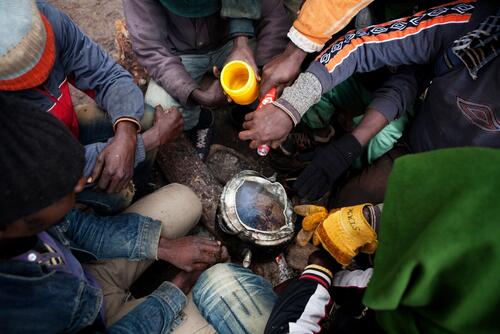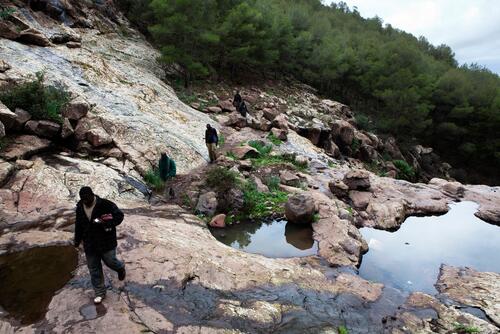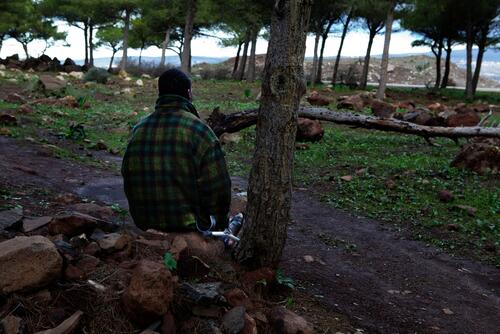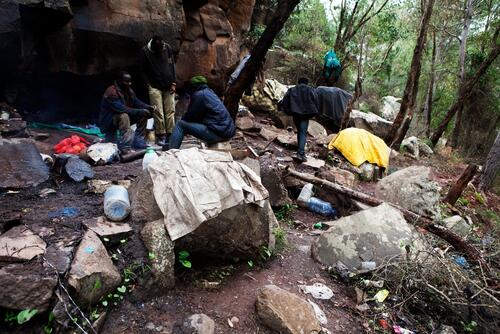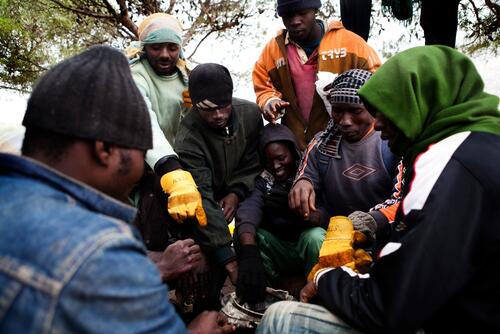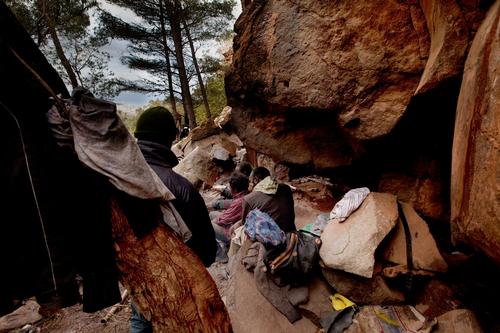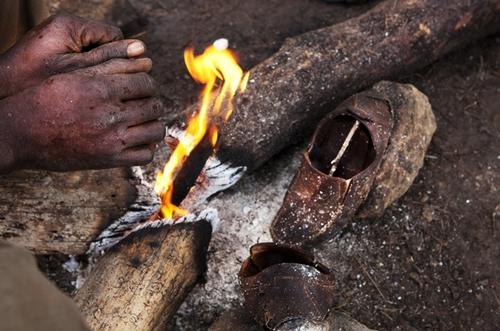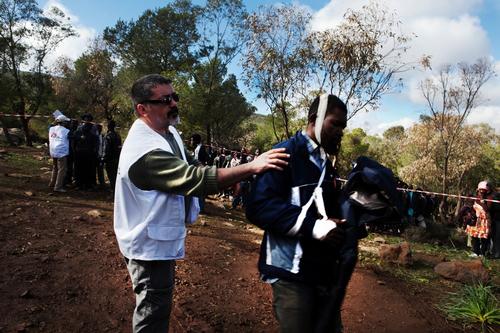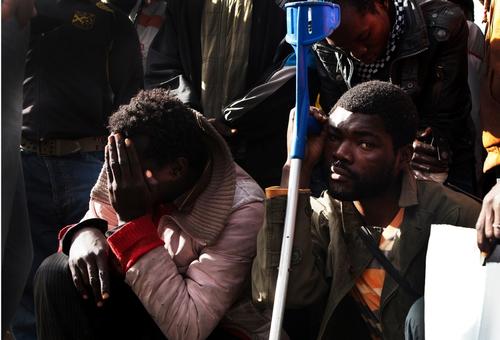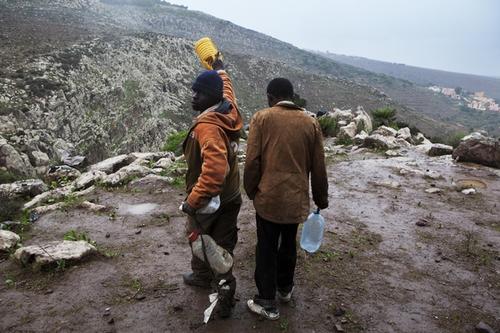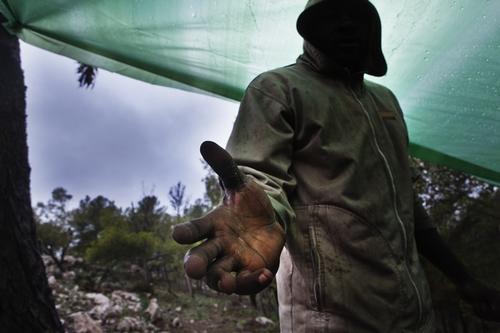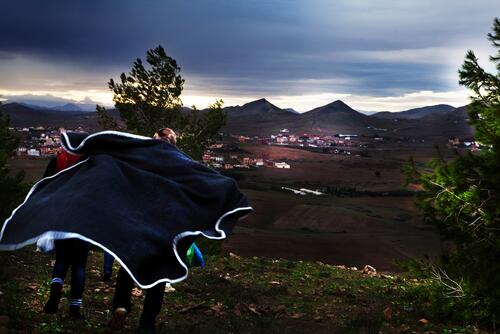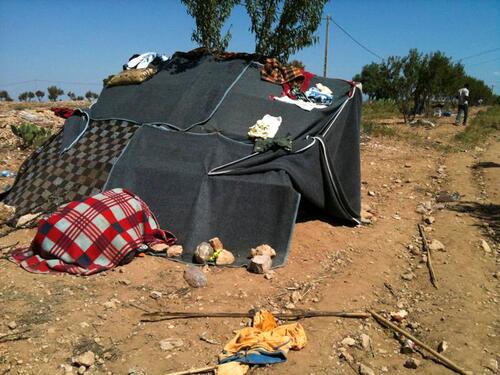They arrive breathless and drenched in sweat, defeated. They have run up Gourougou Mountain in the pouring rain, some limping. Covered in mud, they go back to their ‘home’ under the trees after another unsuccessful attempt to get over the fence into the Spanish enclave of Melilla. On the pretty pine-covered hill, and in the forests of Gourougou, several hundred African migrants are living in makeshift camps, seeking an opportunity to enter Europe.
Stuck here, unable either to go forward. or to go back to their own countries, the migrants suffer constant harassment from the Moroccan security forces, who often use violence to prevent them from jumping over the fence, or send them across the border to Algeria. Unable to work in Morocco, the country has become a dead end for the African men and women who have left their homes in desperation, in search of a better life.
“We'd been waiting all night in the rain, next to the fence, waiting for a chance to get over the fence, but it didn’t come until the morning. In the end, we failed, no one got over.” Mussa shivers in the cold. “There were more than a hundred of us. The soldiers hit me on the head with a stone. About twenty got their feet caught in the barbed wire; we had to leave them there, they were getting hit.” Mussa is 25 years old, from Mali and came to Morocco a year ago. This was his second attempt at crossing the border into Europe.
The people here are young men, mostly from West African countries, who have left their homes because they have no job, no money, no capital, and they have to provide for their family - brothers, sisters, parents – whom they have left behind, in pitiful conditions. “I haven't been able to send anything to my mother or my three younger siblings since I got here,” laments Mussa. He will continue to try to get over the fence. The sea scares him – his first attempt was by sea. He and five friends scraped the money together to buy an inflatable dinghy. Two drowned during the journey.
Some, who have been in Morocco for longer, have made more attempts and have more scars. They have come to accept the actions of the security forces. “Everyone has his job, and the Moroccan soldiers' job is to stop us getting through,” says one man, who calls himself Jack Bauer, after the hero of the TB series 24. “The same goes for the [Spanish] Guardia Civil. They push you and when they catch you – and I'm not accusing anyone, it is the will of God – well, we all know what happens, they're soldiers. When the attempt is over, people have broken arms or legs. If you manage to get over the fence, then it's the Guardia Civil's turn.”.Bauer has made ten attempts to get over the fence so far.
“The living conditions here drive us to the fence. We sleep on the ground and survive by eating fruit and whatever we can find in the rubbish, and sometimes by begging,” says Mussa. The migrants look for shelter in the hills. People from the same country who speak the same language form their own groups. In the winter they make bonfires to boil water and make tea, and to keep warm They sleep wrapped in plastic to protect them from the damp.
Abdou’s camp is a long way from the road, some 20 minutes’ steep climb up to where a slope forms a kind of cave. It isn't easy for the police to get there, “but they do come”, he says. Abdou arrived in Gourougou two months ago, a year after leaving Ghana. He's 21 and would like to get to a European country where he can finish his studies to become a teacher. “It's my only chance, I can't go back to my country.” His companions go to Nador market to beg. He doesn't do this much. “I don't like how it makes me feel inside, and sometimes they insult you, so we hunt for food in the rubbish. I take whatever we find up the mountain,.” Abdou is very afraid of the police, “I am so scared of them. That is why I have not been caught.”
The men are upset that they cannot work in Morocco and that if anyone ever hires them, they cheat them. They pay 20 dirhams (€2) a day, “or they don't pay us and threaten to report us to the police,” says Mussa. They are also often targets of criminals and bandits, but cannot go to the police. “Thieves come with knives and steal, they tell us to give them food, money, your mobile. If you don’t, you get hurt,” says Abdou.
Abdou says that five of his companions were arrested yesterday in the market and expelled. Expelled migrants are taken to the border with Algeria and forced to leave Morocco. However, the Algerian soldiers shoot into the air to prevent them from entering the country. So they return to Morocco. From the border, if you know the way, it takes several hours to reach the nearest town, Oujda, by foot, and then about two days to get back to Nador. Where the cycle starts all over again.
MSF has worked in Morocco since 1997. Since 2003 the organisation has worked with sub-Saharan migrants, who have specific medical and humanitarian needs because of their living conditions and irregular administrative situation. MSF currently has two programmes in Morocco. In Rabat, the capital, MSF teams provide medical and psychological care to migrant victims of sexual violence. In Oriental region, which borders Algeria and Melilla, MSF works to ensure migrants have access to medical care in public health facilities in the city of Oujda. MSF teams also carry out basic healthcare and psychological support during monthly mobile clinics in Nador, and distribute basic shelter materials, hygiene and cooking kits, and help ensure access to safe water and decent sanitation.



